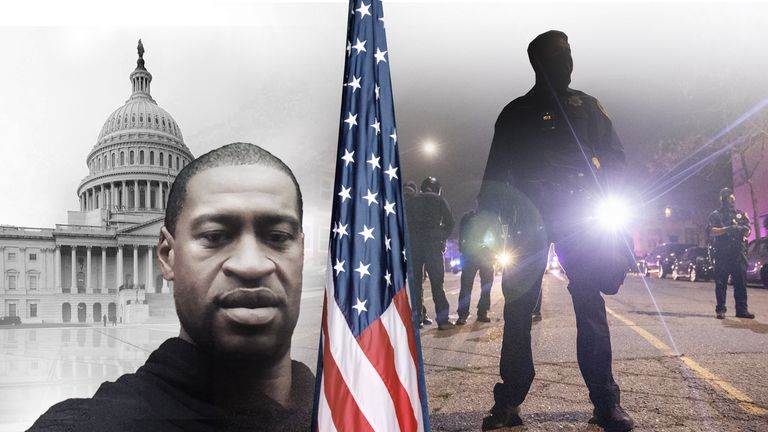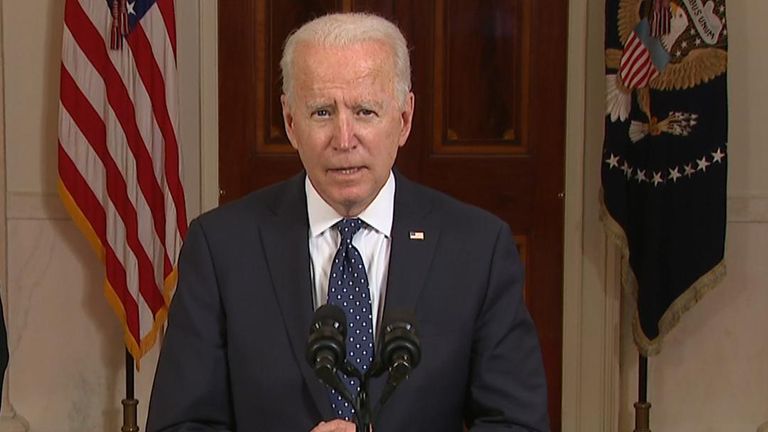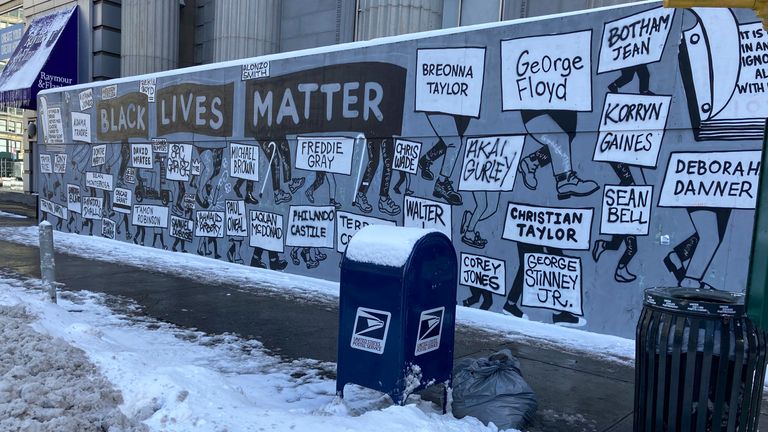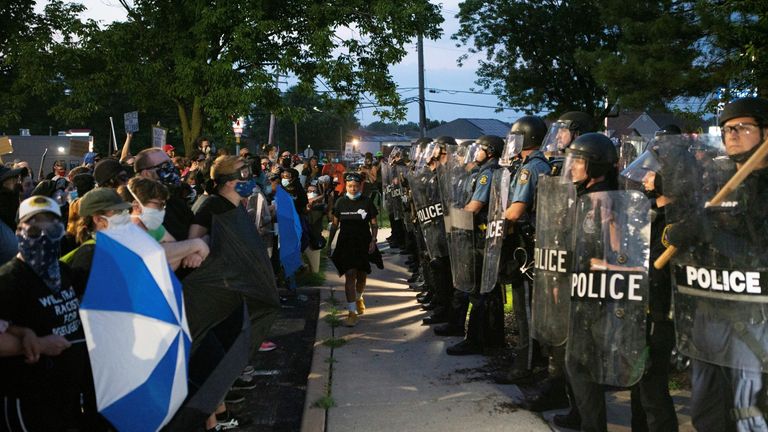The George Floyd Justice in Policing Act: The bill before the US Congress which aims to tackle brutality
Wednesday 21 April 2021 17:02, UK
Those calling for justice for George Floyd were handed some satisfaction with the triple guilty verdict in the Derek Chauvin trial.
But many who protested or spoke out in the days and weeks after his murder say that his death will continue to be in vain until real, lasting change occurs in US policing.
A bill has been drafted in the US Congress which aims to achieve exactly that: The George Floyd Justice in Policing Act.
What does it aim to do?
If it becomes law, the act would put in place a series of measures aimed at reducing the likelihood that police brutality occurs.
Prominent measures include bans on chokeholds and police being able to enter to a property without knocking or announcing their presence, a framework to prevent racial profiling and the establishment of a national registry on allegations of police misconduct.
It will also require all uniformed officers in federal police forces or forces that receive federal funding to use body worn cameras and fit dashcams in patrol vehicles, and will change the rules over use of force.
One of the most controversial measures is the scrapping, for state and local police, of a type of protection for all US government employees called "qualified immunity", which shields officers from civil lawsuits.
Vice president Kamala Harris, who helped introduce the bill last summer after George Floyd's murder, said on Tuesday night the act would "hold law enforcement accountable, and help build trust between law enforcement and our communities".
Where is the bill at?
The bill was passed in the House of Representatives, the lower house in the US Congress, in June last year before becoming bogged down in the Senate, the upper house, which was Republican controlled at the time.
Since the elections in November, it has been reintroduced and was again passed in the House, by a smaller majority of 220-212, with voting on mostly party lines but it is still to receive Senate approval.
What do its supporters say?
In tackling what Ms Harris says is "a long history of systemic racism", supporters say the act will target long overdue injustices, built into the US law enforcement system.
Cory Booker, the US Senator and ex-Democratic presidential candidate and another proposer of the bill, said last year at "the back-end, the bill fixes our federal laws so law enforcement officers are held accountable for egregious misconduct and police abuses are better tracked and reported. And on the front-end, the bill improves police practices and training to prevent these injustices from happening in the first place".
Several elements of the bill are designed to encourage police misconduct or unjustified use of force to be investigated and tracked.
With a number of commentators saying Derek Chauvin was convicted of murder because video of the event was captured on smartphones, supporters hope a requirement for police to use body-worn cameras and dashcams would increase the likelihood of convictions if misconduct occurs.
Subscribe to the Daily podcast on Apple Podcasts, Google Podcasts, Spotify, Spreaker
Similarly, if police are banned from using chokeholds and entering homes on no-knock warrants, supporters say it would cut the likelihood of police ending up killing people they are trying to arrest.
As well as George Floyd, bill advocates point to the deaths of people like Eric Garner, a black man who died following a police chokehold, and Breonna Taylor, who was shot dead by police in a botched drug raid.
Those angered by hardline policing during last year's protests sparked by George Floyd's death hope the bill's control over the transfer of military equipment would help reduce police brutality during demonstrations.
And, by ending qualified immunity, supporters say more people whose rights are violated by police or correctional officers employed by a state, county, or municipality would be compensated - which could act as a deterrent against misconduct, or potentially racist police acts.
What do it's critics say?
Some aspects of the bill won support from Republicans, who proposed their own much narrower bill, which was defeated by Democrats for not going far enough.
It contained a number of the measures, such as the chokehold ban and bodycam promotion, but did not feature the end of qualified immunity, which is the focus of Republican opposition.
Senator Tim Scott of South Carolina, the only black Republican senator, and Senate Minority Leader Mitch McConnell have argued removing the liability shield would undermine public safety and make it difficult to recruit.
Others say the bill doesn't go far enough, as qualified immunity will still apply to federal law enforcement personnel, like customs and border protection, the Drug Enforcement Agency and the FBI, and others claim the bill comes at a time when policing should be downscaled, rather than boosted.
Some local police forces may be exempt because they do not receive federal funding and, therefore, fall outside the jurisdiction of what will be a federal act.
Will it be passed?
Although Democrats now have the potential to control the Senate, 10 Republicans need to vote for it to get the bill through.
After the verdict came through on Tuesday night, there were signs it may be possible for some of those opposing its progress to be won over.
On Capitol Hill, Republicans as well as Democrats said they were relieved and predicted it could give momentum to the policing reform legislation.
Tim Scott said: "I think the verdict just reinforces that our justice system continues to become more just. This is a monumental day in many ways, in my opinion."
With support from President Joe Biden, the bill is likely to the focus of pressure for it to progress in the coming days and weeks and is certain to become law if it does pass in the Senate.







